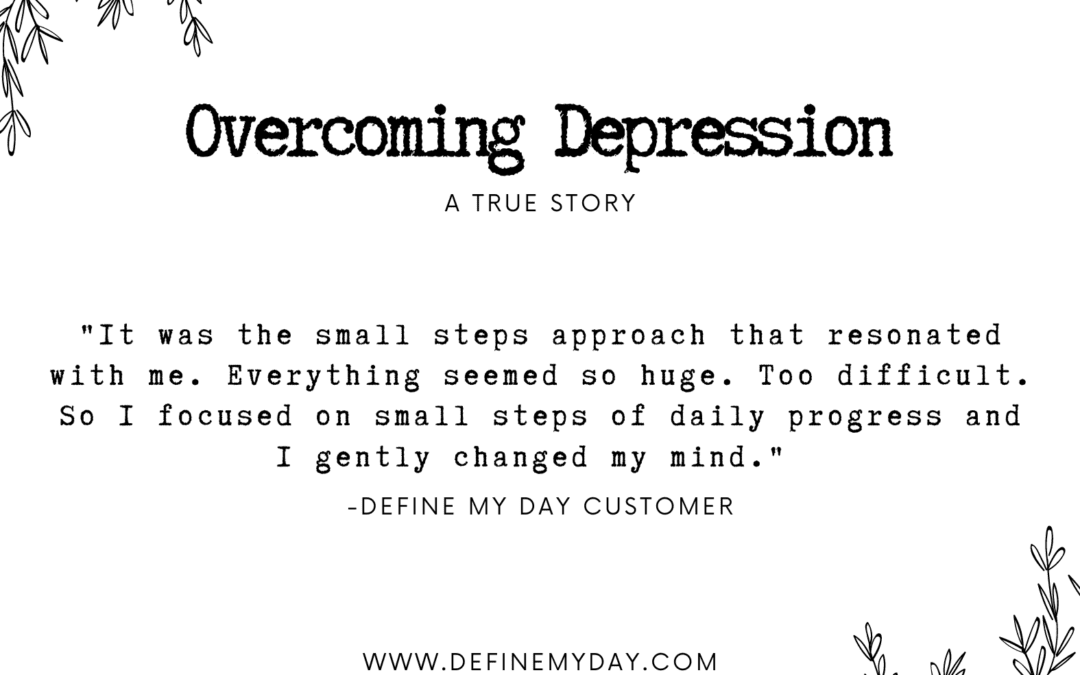Depression sucks. The lack of energy, the overwhelm… the feelings of low self-worth. It’s like being in a dense fog and not knowing, or even having the energy to, move in the right direction. So, you sit in place or maybe even walk in circles – hoping for a light to shine, directing you toward a way out.
When nothing seems to work – therapy, pills, exercise, sleep, talking… whatever, it can begin to feel hopeless. “I tried. I failed again. I now feel even worse.”
Even worse than that, is when the people around you begin to get impatient. Like you want to feel this way. Are you kidding me?
Nobody wants to be depressed. It’s just so hard to break out of it. Nothing feels natural which only adds anxiety to the mix.
Now what?
What I’m about to describe to you is exactly how I navigated my way through feeling like absolute dog sh*t. When I started this process, I was lonely, depressed, insecure, and emotionally immature. Do I still have moments where those crop up, heck yes! But I am in such a better place now.
Here’s the bad news: it takes time.
Here’s the good news: It’s worth it.
Depression is a habit of thought.
Yes, there are chemical causes too. But, many times – I may even say most times, depression is a way of thinking. A pattern of looking at oneself negatively, obsessing over our failings, and being unable to break out of the cycle.
My first step forward, and one that probably gave me the kernel of hope I needed to keep going, was the awareness of what would trigger a negative thought cycle. When I noticed it, I could then take the active measure of thinking about something else. Many times, this came in the form of distraction. When I would start thinking negatively, I would start an audiobook. I would distract my depressed brain from obsessing about itself. It gave me breathing room.
Now, many people distract themselves with unhealthy things like sex, alcohol, or over-snacking. We’re trying to replace those habits with something healthy. I love audiobooks and positive podcasts because they act as a background track in my mind – replacing negative organic thoughts with someone else’s positive stream of consciousness.
Create a Plan
“Yeah right! I don’t even want to move!”
I hear ya. Remember, Rome wasn’t built in a day. We’re not going to plan some elaborate, life-altering quest. We’re going to do something small like, “do the laundry” or “get to bed by 10pm every night” or “limit my TV time to 2 hours.”
Even better, add something positive into your day.
- Find a therapist
- Read for 10 minutes
- Take a 10 minute walk
- Drink water instead of soda
I always envisioned this moment as a train leaving the station. Slowly at first, with a lot of steam and grumbling – like it didn’t want to go anywhere. And it took forever. But, like us, it did eventually start moving.
You Will Be Derailed
Life happens. Even worse, life happens to us. We’ll fall off the wagon, get derailed, and feel like nothing ever changes. But that’s not true. You made progress. Imperceptible maybe but progress nonetheless.
Here’s where grace comes into play. Be gentle with yourself. You may want to beat yourself up. Don’t. Step back and observe.
What happened? Did you get tired? Ok, go slower.
Did something outside of you knock you off the tracks? What can you do about it? Set a boundary? Maybe nothing can be done.
Regroup. Avoid giving up too much ground. Start again. Maybe slower. Be gentle.
Learn About Yourself
As you experience success and failures, make an effort to step back and observe triggers and reactions.
It can be hard for many of us to identify what we’re feeling and why. This is where I found audiobooks and podcasts most helpful. I didn’t know what I was feeling but when I listened to descriptions of behaviors that I could relate to I knew I was onto a topic I should dive deeper into.
I would hear someone on a podcast talk about emotional neglect, describe an experience or a feeling that felt familiar, and I would immediately download a book on the topic. I did this with trauma, boundaries, attachment styles, and shame. Anytime a behavioral description felt familiar, I was determined to learn more about it – and in turn, myself.
The understanding I gained about why, and who, I am helped me immensely through this journey. It gave me a sense of purpose to it all. I saw the cause and effect. I began to see a path forward. And, most of all, I learned it wasn’t my fault.
Growth Through Grace
The pendulum swing of progress and failure seems constantly cruel. A few steps forward just to get knocked back again. But the forward progress did happen over time.
The back-and-forth offered perspective also. Getting put back into a depressive state allowed me to see the brighter days more clearly. And the brighter days helped me see the bad ones as an impermanent and distorted truth. I began to ride out the bad days differently. Seeing them as temporary moments that would eventually pass. I learned to prepare myself for their eventual end and get moving forward more efficiently.
Practicing gratitude along the way is critical. Gratitude for the good days and the bad – for the perspective. By making it a point to actively be grateful each day, I learned to find more to be grateful for, even if it was simply, “a quiet morning” or “I woke up.”
Building on Successes
As the train gets moving and momentum builds, I found it easier to add more healthy moments and habits. Increased exercise, a better diet, or social interactions. I could accomplish more work, keep a cleaner environment, and even plan further ahead in the future.
Once again, bad days and failures did occur but, they weren’t so tragic or damaging. With each step forward, new awareness would come to me. I learned about my authentic likes and dislikes, I saw relationships differently and I learned to be happy alone.
Failures also began to look like successes. They offered clarity and allowed me to see what I didn’t want or where I needed to do more work. They were enriched with a sense of purpose and knowledge. Failures were no longer an indictment. They were instead signposts on my journey, directing me along the way.
Define My Day Changed My Mind
My planner has been sort of a guidebook for me. A log of my travels. Sometimes lost. Often times abandoned and forgotten. But I keep coming back to it.
Define My Day has offered me something I had never experienced before – a sense of continuity.
It has been a framework to guide me and a mindful practice to keep me grounded. In it, I can see my growth and my struggle. I’ve learned to take more time for myself. Most of all, I’ve learned that I can do more by taking small steps forward each day rather than making big changes and wearing myself out.
What You Can Do Today
If you are currently using Define My Day or the Defined Life Planner, great! Keep it up. The process will guide you through all of this.
If you aren’t using our planners yet, that’s ok! Here are some things you can do today to get moving forward on your path.
- Pick one healthy thing you want to do today. Schedule it. Do it. Reward yourself after.
- Pick one unhealthy thing you want to stop. What distracts you or harms your progress? Plan how to avoid engaging in it.
- Sit in gratitude. Set a timer for 2 minutes. Sit down comfortably, close your eyes, and picture something you appreciate.
- Give yourself grace. Picture your younger self standing in front of you. How can you show him or her that you love them? What would you say?
- Write to yourself. How do you feel? What is bothering you? What makes you feel good? How can you make a positive step tomorrow? Be brief. Be verbose! Give it a try.
- Get support. A trusted friend, a loved one, or a therapist who fits your style. Join a community of healthy people or simply read a book. Expand your circle – just a hair. You’re a social animal at your core.
Be well. Be patient but keep moving forward. Remember, small daily steps lead to great destinations over time.


I need to take small steps instead of trying to tackle all of it at one time. That’s just discouragement! Thank you for your article! Very helpful. The best to you on your journey.
Exceptional advice. I work with a therapist , take medication and with her sensitve and caring approach I am beginning to dig out of the darkness. She is helping do the very strategies you suggest. I have come to realize that my depression and anxiety are triggered by a long enduring trauma bonding. And everything has not always been my fault. I lost myself and am still trying to find the ” me” I was. Depression led to hopelessness and choices that led me to a very dark place in my life . Society needs to drop the stigma on mental health issues and help with affordable resourses as well as supportive and compassionate understanding not condemnation.
Yes this is soo true . It s soo difficult to get the help we need.